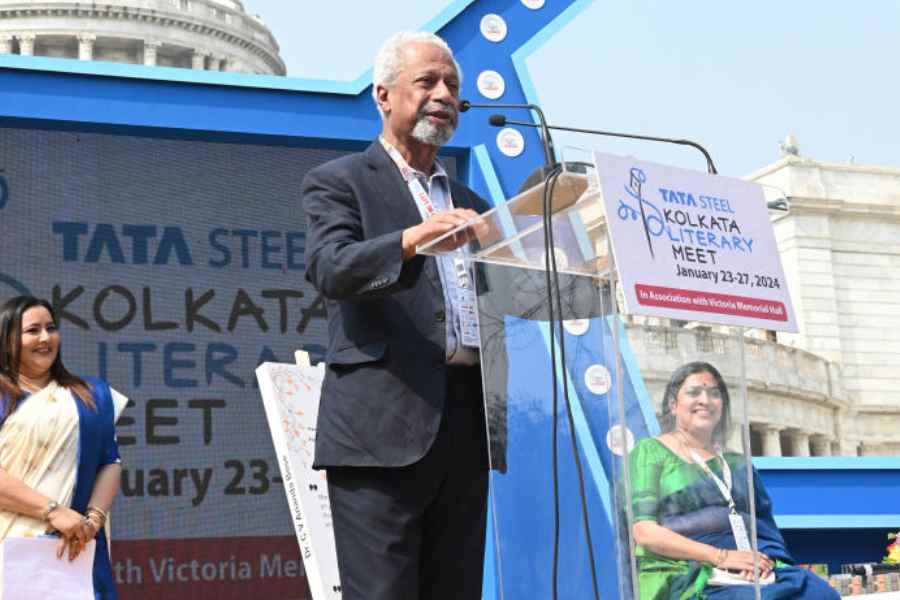Colonialism is not merely a thing of the past but continues to shape the world, 2021 literature Nobel laureate Abdulrazak Gurnah said on Tuesday.
“To say it (colonialism) is over is not to understand the causes or so much of the conflict that is going on in the world now — in Africa, in the Middle East (West Asia). Many of these conflicts arose out of decisions made for the administrative convenience of the colonising powers,” said Gurnah, a Tanzanian-born British novelist and academic, who was the guest of honour at the Tata Steel Kolkata Literary Meet, in association with the Victoria Memorial Hall and The Telegraph.
The first session — A Life in Writing — of the festival saw Gurnah in conversation with writer-editor Nilanjana S. Roy.
Roy said her generation and those that followed grew with the idea that colonialism was a thing of the past until they were “corrected” by Gurnah’s writings. “What is it that we miss out on when we think of colonialism as an empire or a thing of the past?” she asked.
Gurnah, whose novels include Paradise (1994), By the Sea (2001) and Desertion (2005), spoke of multiple forms of colonialism.
“There are forms of colonialism that we see being replayed right now in Europe itself. The Russian form of colonialism is just colonising the adjacent cultures and societies. That particular form of European colonialism, the one that crossed the seas and went to strange areas, it transformed the world. We can’t say what is done can be undone.... Borders cannot be changed. Nobody wants to give up a tiny inch of land. But, these borders do not make sense in many cases and are often the cause of conflict.
“Look what is happening now in formerly French territories of West Africa. The French did not actually leave. They kept their bases, they kept their currency and they made sure that dependency continued. How can we say that colonialism is over with these events taking place in our time?” he said.
Gurnah was born in the Sultanate of Zanzibar and moved to the UK in 1967 as a refugee during the Zanzibar Revolution.
He was awarded the 2021 Nobel Prize for Literature for his “uncompromising and compassionate penetration of the effects of colonialism and the fates of the refugee in the gulf between cultures and continents”. He is also the Emeritus Professor of English and postcolonial literatures at the University of Kent.
His session saw a full house at the Son Et Lumiere of the Victoria Memorial. After it was over and he agreed to sign copies of his books, a long and snaking queue took shape at the bookstall.
When the house was opened for questions, a member of the audience asked Gurnah about the change in England’s immigration policy from the time Gurnah went there.
The British government stands accused of being markedly hostile towards migrants, especially those arriving on small boats.
“How do you look at this? From a country that colonised the world, benefitted disproportionately from it, to be able to stop people from coming into their country for their benefit,” the man asked.
Gurnah spoke of a “design” to keep out migrants in today’s England.
“I think it is different. I went to England in 1967. Pretty soon after that, there was the infamous Rivers of Blood (an inflammatory and divisive speech made by a parliamentarian, Enoch Powell, on April 20, 1968). We think of the speech not because it was the worst thing. But he was echoing something that was going on in the country. You would be amazed to know how many people actually embraced that, from all sorts of different political positions,” said Gurnah.
“On the other hand, there was a kind of gentleness about the way the authorities dealt with strangers or migrants. Now, there is a profound hostility. Not only because of the changes in the law but there is a design now to keep people out even when there is a good reason to allow them. It is a really different atmosphere about the welcome that strangers might receive,” he said.






